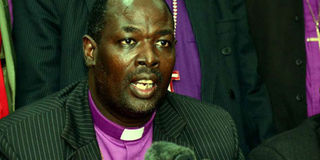ACK power wrangles put church in the spotlight again

Anglican Church of Kenya Archbishop Jackson ole Sapit addresses media at All Saints Cathedral on September 27, 2017 calling for an end to the political crisis in the country. Three pastors moved to court suing Archbishop Sapit, seeking to stop him from consecrating Rev Alphonce Mwaro as Mombasa bishop. PHOTO | FRANCIS NDERITU | NATION MEDIA GROUP
What you need to know:
- Over the years, the place where the battle has been fiercest has always been the election of the archbishop.
- During President Daniel arap Moi’s regime, most of the Kanu hawks degradedly called it the Church of Politics of Kenya.
I was a young reporter at the now defunct Kenya Times newspaper when I was assigned to cover the election of the Archbishop of the Anglican Church of Kenya at the All Saints’ Cathedral in 1996.
It was a fierce contest pitting Bishop David Gitari against Bishop Joseph Otieno Wasonga.
The elections went on late into the night.
To kill time I walked around the church compound where I stumbled upon a group huddled together under one of the shrubs at a secluded corner.
I surmised that they must have been Wasonga’s voters for I heard one of them complain bitterly in Dholuo, ‘Jogi mawa gini’, which loosely translates to these people are robbing us of this thing.
In this case “this thing” meant the archbishopric.
ELECTORAL FRAUD
I was stunned that there could be claims of electoral fraud in a church election.
In retrospect, my shock was just because I was still a wet behind the ear reporter.
As I continued covering more stories in then Church of the Province of Kenya (CPK) I came to learn that controversy was part and parcel of this church, appearing as if it was part of its liturgical order.
So much so that during President Daniel arap Moi’s regime, most of the Kanu hawks degradedly called it the Church of Politics of Kenya.
The name was later to change to Anglican Church of Kenya but the controversies never went with the change of name.
BISHOP KALU
Over the years, the place where the battle has been fiercest has always been the election of the archbishop.
From open political bias to serious infighting and demonstrations, the church has been in the forefront in giving the Kenyan media fodder for its readers and viewers.
For close watchers of the church, events that occurred over a week ago in Mombasa were never strange but rather a continuation of a long held tradition.
Bishop Julius Kalu, who has served the diocese for 24 years, was retiring.
LAWSUIT
When the elections were held, ACK Bishop Hannington Institute of Theology and Development Studies lecturer Alphonce Mwaro Baya was declared the winner after three rounds of voting.
Rev Mwaro, 39, was declared the bishop-elect when he beat the Mombasa Memorial Cathedral provost, Rev Festus Kiseu, and the vicar of ACK St John Church, Rev Richard Otieno.
Then the drama started. Some clerics threatened to go to court to dispute the election and stop the bishop-elect’s consecration, claiming the poll was rigged in his favour.
On his part, the outgoing Bishop Kalu urged caution urging the brethren to abandon the court route.
“Don’t be too quick to go to court on any matter concerning the Church.
"We have enough people who can solve the impasse in case of a problem. We are supposed to sit down, dialogue and solve any issues,” he said.
SAPIT SUED
His entreaty seemed to have fallen on deaf ears because no sooner had the ink dried on his statement than three pastors moved to court suing Archbishop Jackson ole Sapit, seeking to stop him from consecrating Rev Mwaro.
Reverends Emmanuel Wanje Nzaka, George Gonah Kuza and Tom Komora Dawa pleaded with the court that the planned consecration of Rev Alphonse Mwaro Baya be put on hold until their case is heard and determined.
This combative stance is very much part of ACK’s history.
Bishop Joseph Wandera was recently elected to head Mumias Diocese after a similarly long-drawn process.
CHRISTIANITY
Mr Jesse Masai, communication specialist and observer of the Kenyan religious scene, says that what is happening in the Anglican church mirrors what happens in the larger body of Christianity.
How shall we live?
“For a Church that blazed the trail in the ordination of female priests and other renewal efforts, the tensions within it point to the unfinished task before us all in St Paul’s words: ‘How then, shall we live?’”
"It should concern us that other mainstream and fringe Christian communities similarly struggle to resolve entrenched clan, ethnic, political and material interests that seem to be thicker than the blood of Jesus Christ.”
SECESSION
Going back into history, one would see a church whose past is littered with many fissures.
Many would remember when Bishop Eliud Okiring (deceased) led a bitter fight for secession of the Iteso from Nambale Diocese because of alleged mistreatment of his community.
When things did not go his way, Bishop Okiring and his faithful travelled to Nairobi where they staged a hunger strike until the Archbishop Manasses Kuria was forced to cede to their demands.
But it is at the elections where the battle has been tough with claims that most of the time the powers that be have a say on who gets elected.
EXOGENOUS INFLUENCE
After the first African Archbishop Festo Habakkuk Olang’ retired in 1980, there was talk that there were a lot of outsider interests in the race.
Rev Canon Francis Omondi of ACK writing in the blog Waanglicana says:
"Over the years our electors have not been immune to non-spiritual influences in their task.
"The election of the second archbishop was deemed as controversial and widely regarded to have been influenced by extraneous forces.
"Bishop Henry Okullu of Maseno South diocese had been widely regarded as the frontrunner to succeed Archbishop Olang."





